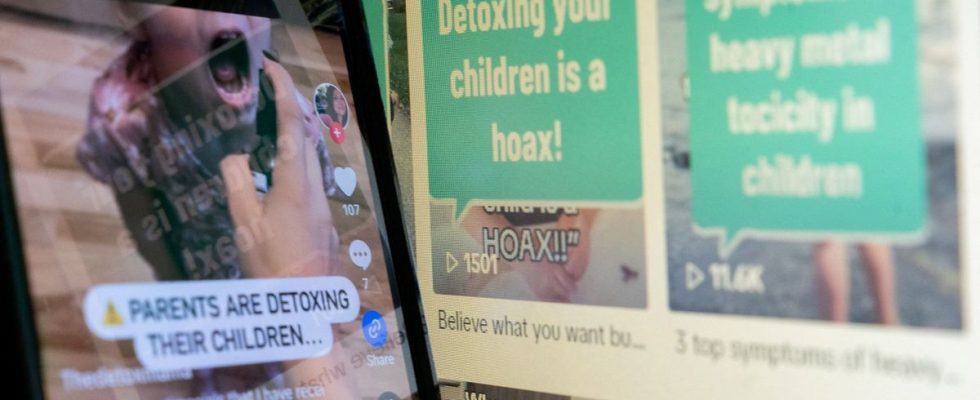Published on
Updated
Reading 3 min.
On TikTok, mothers presenting themselves as “detox” specialists extol the merits of alternative remedies to treat behavioral disorders in young children. This advice, failing to have scientific value, conceals fraudulent and potentially lucrative commercial practices for those who promote it.
Influencers, often mothers, enthusiastically encourage their subscribers to use “detoxifying” mist sprays and other miracle remedies, emphasizing the effectiveness of these products and their ability to eliminate heavy metals and other parasites from the body.
Sometimes accumulating millions of views, these TikTok accounts claim to offer simple solutions to emotional, eating or autism spectrum disorders.
Pseudo nutritionists easily circumventing the moderation rules of large platforms, and publishing false and potentially dangerous information for health, capitalize on the vulnerability of certain parents, thanks to fraudulent network sales techniques, described as multi-level marketing ( MLM).
In one of her videos, influencer Danica Walker, who describes herself as a “detox” expert, promotes a spray that is supposed to treat her baby’s mood swings in just a few weeks. Like other posts on his page, the video is not marked as advertising content.
However, Walker’s profile redirects to the site of a private company with the hallmarks of MLM — a network recruiting independent representatives to sell its products directly to consumers. On the site, there are so-called “detox” products, including the spray appearing in Walker’s video as well as an affiliate recruitment program.
Neither Walker nor the company associated with his account responded to AFP’s questions about the nature of these publications. Comments under the video claiming the product “doesn’t work” and is “expensive” also solicited no public response from Walker.
Scam
This model of selling products without any medical or scientific basis has become popular on the social network. Many influencers seem to escape legal action by simply clarifying that these are not “medical recommendations”.
“It’s now part of their business practices — ‘I’m sharing this tip with you, from one mom to another, I’m not a doctor’ — it protects them legally, but it also helps them connect with their audience“, notes Abbie Richards, specialist in misinformation on TikTok.
“The information shared could be completely invented, just to make sales, and it would not be displayed as advertising“.
Affiliates can earn a commission, either through direct sales of products or by recruiting new representatives, comparable to a “Ponzi” scheme, according to the US Antitrust Authority (FTC).
However, such practices go against the conditions of use of the platform.
“Our Community Guidelines clearly state that we do not allow MLM“, confirms a spokesperson for the Chinese giant.
According to Jonathan Stea, a clinical psychologist and assistant professor at the University of Calgary in Canada, the consequences of this “pseudo-scientific disinformation” on real life are huge.
Stea calls these remedies “scam“.
“There is no hard evidence to support the scientific value of treatment aimed at removing “toxins” from the body. Ultimately, a ‘detox’ bath is an imaginary cure for a non-existent problem“, concludes the professor.
Exploit vulnerabilities
Parents of autistic children, in particular, have criticized certain influencers for promoting false treatments for commercial purposes, in the case of accounts offering products supposed to erase language delays and allow non-verbal children to express themselves through singing.
A lot of you (influencers) come up and talk to me privately and say, “Hi, I know your child has autism, I have just what you need. I have the perfect remedy for you“, explains Anna Maria in a video posted on TikTok.
“Stop“, she continues. “Stop Exploiting Mothers of Children with Special Needs“.
Tiktok seems to be full of pseudo-experts, with little or no qualifications, relaying all kinds of recommendations to other users of the platform, on subjects like vaccination and abortion, which can have serious repercussions on future medical decisions.
In 2022, the media monitoring group, Media Matters, revealed the existence of another MLM scam system on TikTok, centralized on weight loss products not certified by American health authorities.
“TikTok’s inability to detect MLM of this magnitude sets an unencouraging precedent for sufficient moderation of these systems“, the agency then underlined in its report.
“The platform benefited from positive media feedback after announcing the ban on MLMs (in December 2020), but its actual application seems to have failed.“
